If you’re about to cold write an email, then these cold email copywriting tips and templates will help you to set the right tone from day one.
1. Create an irresistible subject line
Before you do anything else, you need a catchy subject line for maximum open rates.
It may take some trial and error to find the perfect subject line for your email leads. But here are some best practices that all the best cold email subject lines have in common:
- Keep it short: Under 50 characters is ideal
- Personalize it: Using the recipient’s name or company details will grab attention
- Be specific: State the purpose of your email
- Use action words: Verbs like “discover” or “learn” can motivate the reader to open
- Ask a question: This can open the conversation and pique interest
- Use humor: If appropriate, this can help you to stand out and stay memorable
- Avoid spammy words: Words like “FREE” or “Limited Time Offer” can trigger a spam filter, landing your cold email right in the spam folder

2. Personalize your emails
People can smell a vague, non-specific cold email a mile off! If your email looks generic enough to be sent to the same 50 people, then you might need to rethink your cold email copywriting strategy.
Personalized emails will give you a major advantage. Even simple details like mentioning the email lead’s name in the opening line, or their company name in the body copy can make a difference (and lots of cold email providers like lemlist let you do this automatically).
And if you can go beyond the prospect’s company name, even better. In the cold prospecting example below, the writer mentions attending a webinar that the recipient hosted.
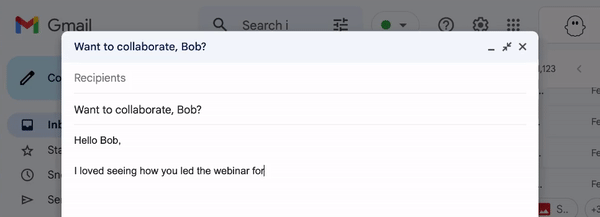
3. Make it all about them (not you)
You might be excited to share your sales pitch, but a word to the wise—hold off sharing about yourself, and focus on the recipient.
Think about what your audience’s goals and pain points are, and focus your cold email body copy around that.
In this cold prospecting example, the writer mentions how the recipient had mentioned something relevant during the webinar.
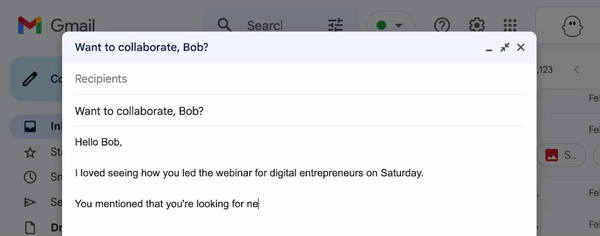
4. Avoid “sales-y” language
There’s nothing like some industry jargon to dull the senses! Even if your recipient understands all the “business speak”, it will probably have them yawning within seconds.
Instead, focus on using human, authentic language to explain your product/service. If it helps, imagine that you were talking to them verbally, and then write with similar words and sentences.
You’ll sound more like a real person—just like our example below, which uses personal, positive language to create the desired effect.
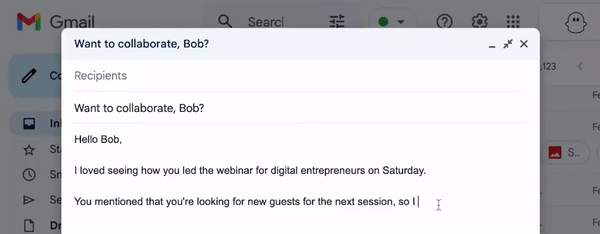
5. Keep it simple
For the first email, don’t bombard your reader with information. Once you’ve established a connection and sent your follow-up emails, you’ll be able to go into more detail.
For now, focus on the bare essentials and write them in simple sentences broken into logical paragraphs for easy reading.
Notice how in the cold email example below, the writer describes their business in one sentence, with just one hyperlink.
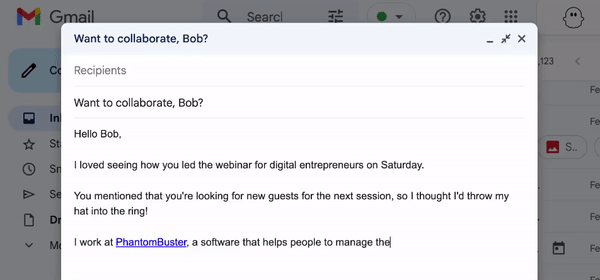
6. Have one clear call to action (CTA)
A successful cold email will clearly explain what your target audience should do next. Avoid an open-ended question; make it clear what you want the recipient to do once they’ve finished reading your cold email.
Do you want them to click to book a phone call with you? Reply to your email? Read a case study for social proof. Hint: Don’t ask them to do all three things at once!
Instead, identify what you want your cold email to achieve and focus your CTA on that. In the cold prospecting example below, the writer simply asks the recipient to reply and tell them whether their offer resonates.
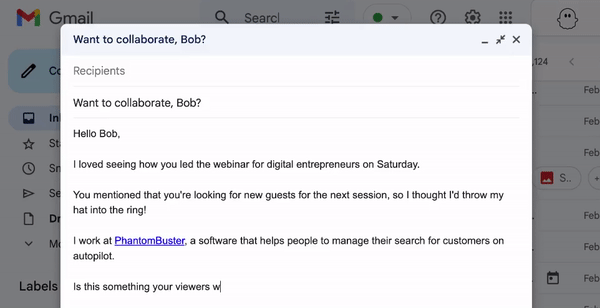
7. Proofread several times before sending
You’d be surprised how many spelling and grammar mistakes can slip through the cracks. Read your email backwards and share it with a colleague before you hit “Send”.
And you can also use tools like Grammarly as a rough guide, while you’re writing.
Also, take this time to make sure your cold email hits all the right notes: a compelling subject line, personalization, clear language, and a strong call to action that resonates with your target audience.
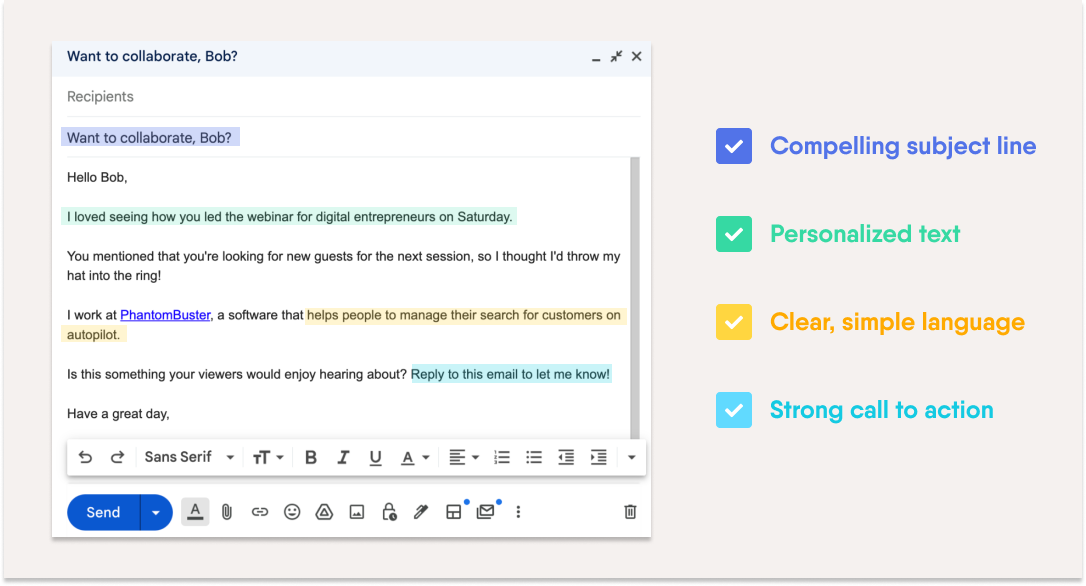
8. A/B test different versions
Last, you can test different email versions to see which performs best. A/B testing lets you compare two versions and identify a “winner” based on opens (for subject lines) or clicks (for email content).
You should only test one thing at a time for the best results. This will help you to pinpoint precisely what works, and what doesn’t.
Many cold emailing providers let you run A/B tests, so make the most of this to optimize your cold email content.
Here are some ideas of things you can test:
- Subject line length: Long or short?
- Emojis in the subject line: Yes or no?
- Personalization: Does mentioning names get more clicks?
- Language style: Formal or informal?
- Email length: Longer email, or a shorter email?
4 Cold email templates to follow
If you need extra inspiration, here are 3 proven cold email copywriting formulas that get results. We’ll break down each formula, and then share a cold email copy template underneath for you to follow.
1. The “Star-Chain-Hook” cold email template
The formula:
Star: Share your big idea.
Chain: List the facts, sources, social proof, reasons, and benefits.
Hook: Share your CTA.
A “Star-Chain-Hook” cold email example
Hi {name},
Imagine if you could search for new customers online, without lifting a finger.
I work for PhantomBuster, a lead gen automation tool which can find potential customers for you on autopilot. Here are just some examples of how you could free up your workload with us.
What would you do with all that extra time? Perhaps you’d take up knitting, or kite-surfing, or kickboxing, or whatever else floats your boat.
If this sounds like you, then click here for a 14-day free trial (no credit card needed).
Enjoy your day,
Megan
2. The “Before-After-Bridge” cold email template
The formula:
Before: Describe their world right now.
After: Help them imagine what it would be like if you solved their problem.
Bridge: Explain how to get there.
A “Before-After-Bridge” cold email example
Hi {name},
We’ve all been there. Manually trawling through LinkedIn, trying to find people who are interested in buying. It takes hours, and it’s hard to filter through all the noise.
The good news is, there’s an easier way to do it!
I work at PhantomBuster, and our dream is to help you to find your dream customers on autopilot—including on LinkedIn. Whether you need to extract professional emails, auto connect with potential leads, or gather public profile data, we have a tool to help you get there.
Click here for a 14-day free trial. You don’t need a credit card, and there’s no strings attached.
Enjoy your day,
Megan
3. The “But You Are Free” cold email template
The formula:
Make a request, and then tell your prospect that they’re free to do whatever they like.
A “But You Are Free” cold email example
Hi {name},
I saw that your company secured extra funding this month; congratulations! If you’re looking to scale right now, then I think you might enjoy using PhantomBuster.
It takes over your online search for customers, from LinkedIn to Instagram, while you can focus on more important things.
Click here to try it for free, no strings attached.
(But of course, if you’d rather keep doing things the manual way, then that’s cool, too!)
Best wishes,
Megan
4. Funny sales emails can work, too
Sometimes, the best cold email uses humor to stand out. If you’re considering the benefits of funny cold emails, then here’s a classic example from Gusto which ticks all the boxes.
A funny sales email example from Gusto
Hi {name},
I know these sales emails can be a little awkward so here’s a picture of our company dog, Finnley, standing on a desk to break the ice:
Now that we’re old friends, if you had to give your current payroll provider a score between 1 and 10 what would it be?
If you didn’t just yell “10!” at your monitor, here are two very simple, very good reasons why we should have a quick conversation about moving {company}’s payroll to Gusto…
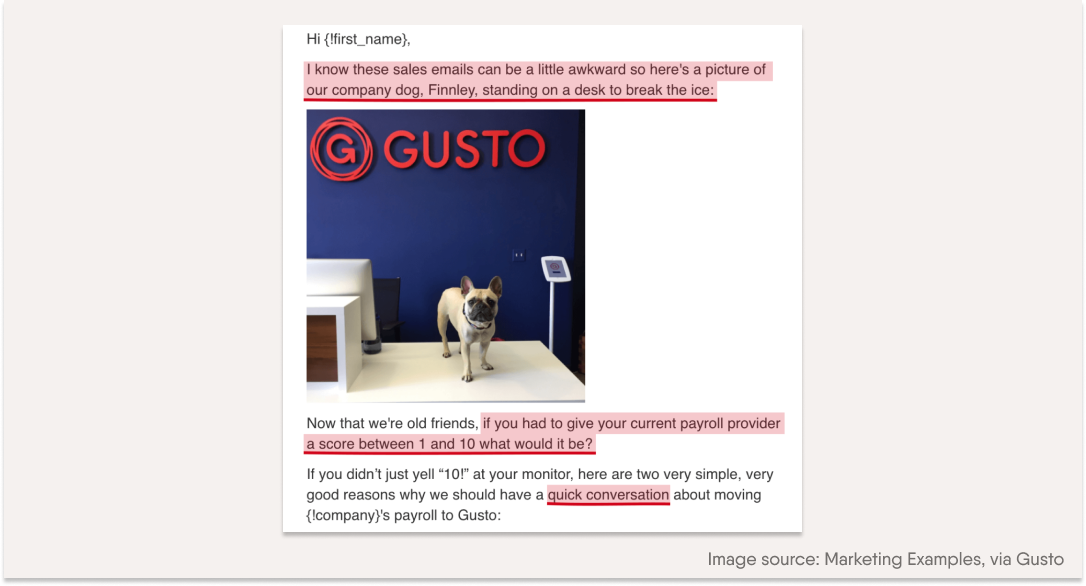
How to find prospects’ email addresses
How do you find your dream customers’ email addresses (without losing hours in the process)?
We recommend using a tool like PhantomBuster that can run automated actions on your behalf across LinkedIn, Sales Navigator, Google Maps, and more.
It can also search for your email addresses via its inbuilt email discovery service or your Dropcontact, Snov.io, or Hunter.io account.
Here are some examples of how you can find email addresses with PhantomBuster (and plug them straight into your CRM).
1. Find emails from a LinkedIn or Sales Navigator search
2. Find emails from a Google search
3. Find emails from a website
4. Find emails from someone’s name and company name
5. Add your PhantomBuster results to your CRM
How do email discovery credits work?
Each PhantomBuster plan comes with a certain amount of email discovery credits. One credit represents one attempt for finding a person. The service uses a full name and company name to find an email address, then verifies it to only return those that are correct. You can learn more about PhantomBuster’s email discovery service here.
1. Find emails from a LinkedIn or Sales Navigator search
To get the best conversion rate for your cold emails, you must ensure you’re targeting the right people. LinkedIn and Sales Navigator let you run detailed searches to find the exact profiles you’re looking for. PhantomBuster can then scrape profiles from these search results to find their email addresses.
Here’s how it works:
- Open the LinkedIn Search to Emails Flow (or the Sales Navigator one)
- Connect your LinkedIn session cookie
- Share the search URL(s) that you would like to extract emails from
- Specify your launch settings and choose your email discovery service
Et voila! You’ll get the results in a neat CSV file, ready to plug straight into your spreadsheet or CRM.
Watch this video tutorial for a more in-depth guide.
Bonus tip: Are you using lemlist? You could also try our LinkedIn Search to lemlist Campaign Flow, which migrates all the data from a LinkedIn search straight into lemlist, for you.
2. Find emails from a Google search
If you want to target prospects, startups, or businesses in a specific location, then Google Maps can be a goldmine. All you need to do is share your Google Maps search, and then PhantomBuster will extract all available contact data for businesses listed in that search.
Here’s how it works:
- Open the Google Maps Search to Contact Data Flow
- Give the URL(s) of the searches you’re interested in
- Choose which contact information you’d like to extract (emails, social media profiles, etc.)
- Launch the Flow
Your results will appear in your Flow console, just like that.
Watch this video tutorial to learn more.
3. Find emails from a website
If you already have the websites of your potential clients, then PhantomBuster can run through these and search for their email addresses from there.
Here’s how it works:
- Open the Data Scraping Crawler Phantom
- Give the URL(s) of the web pages
- Specify which contact and social media data you want to extract
- Choose your settings, then launch
Your results are ready to rock and roll! Watch this video guide for a more in-depth explanation.
4. Find emails using someone’s name and company name
What if you just have someone’s name, and their company name? We’ve got you! PhantomBuster can process this information and use your email discovery credits to search for their professional email address.
Here’s how it works:
- Open the Professional Email Finder Phantom
- Give the full name and company name of your prospect(s)
- Choose your email discovery service, then launch
The results will appear in your console in no time. Here’s a video tutorial to walk you through this, step by step.
5. Add your PhantomBuster results to your CRM
With PhantomBuster, you can gather hundreds of leads on autopilot—and then connect the results with your CRM.
- Discover the HubSpot CRM Enricher Phantom
- Discover the Salesforce CRM Enricher Phantom
- Discover the Pipedrive CRM Enricher Phantom
That’s all for this blog! You’re now an expert in cold email copywriting, AND you know a thing or two on how to source email addresses automatically, thanks to PhantomBuster.
